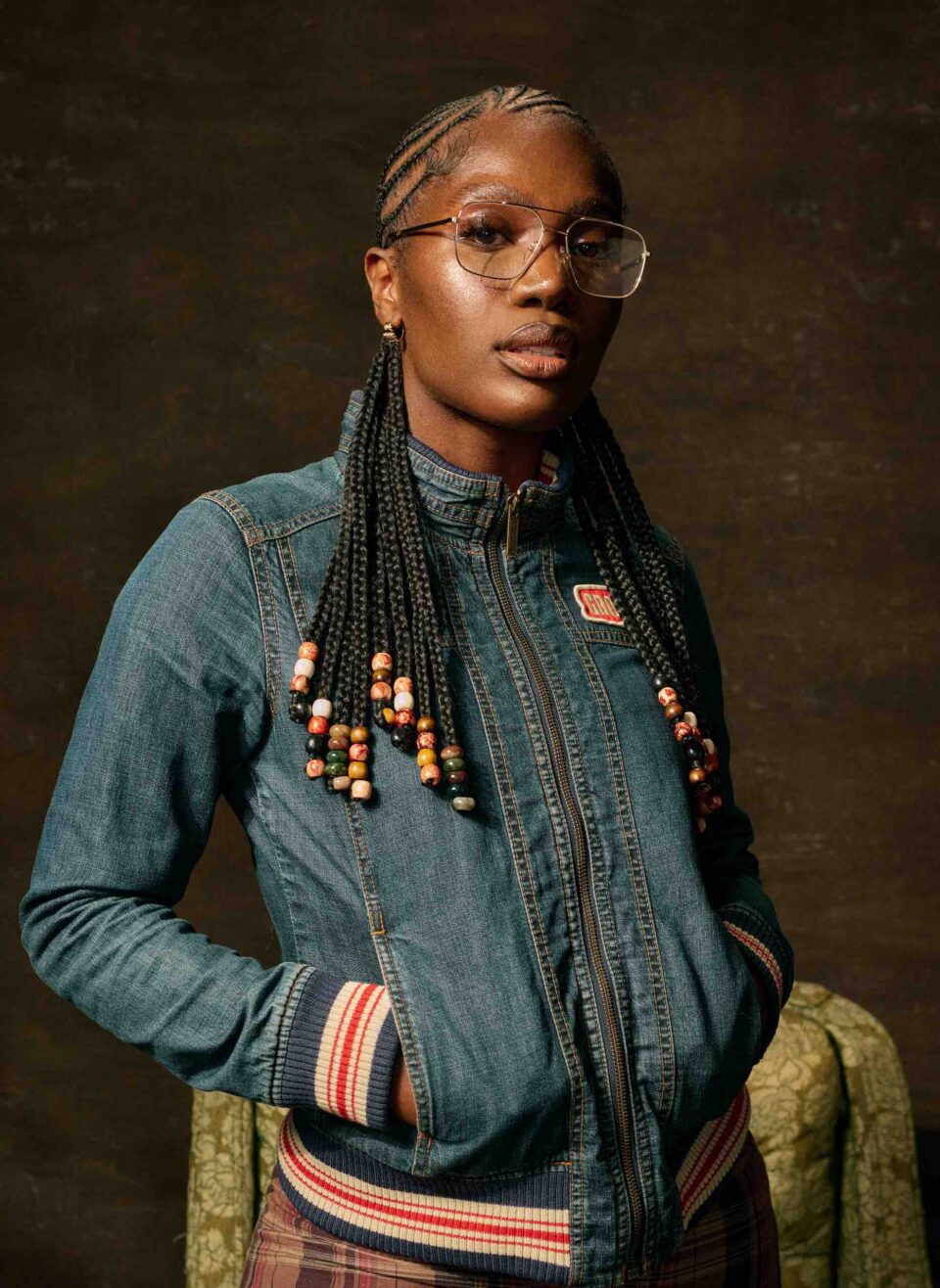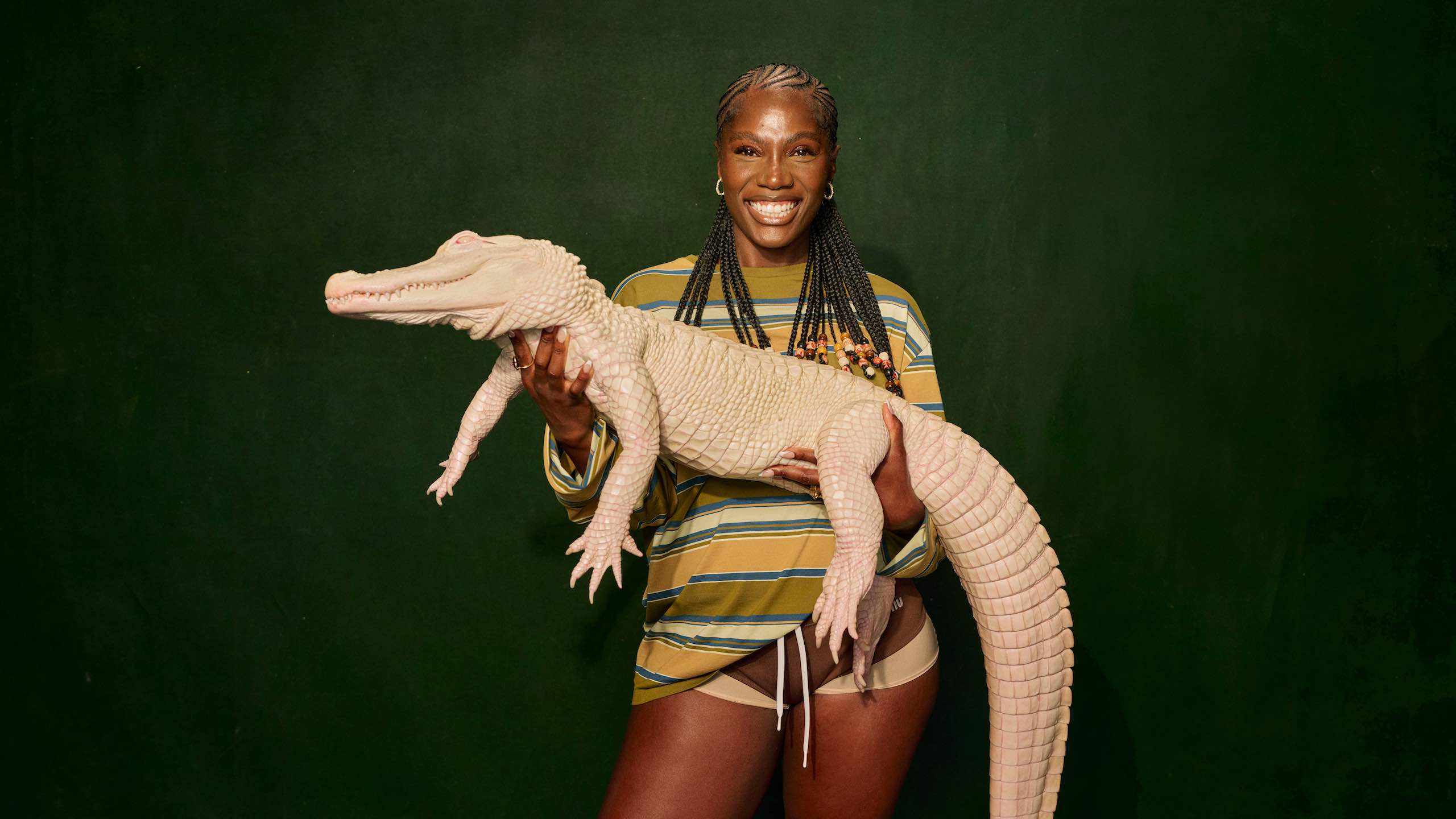Rapper, singer, and producer Doechii has dropped a formidably frenetic host of singles and EPs dating back to 2018 that have continually proved her unparalleled pop-rap savvy (e.g. the TikTok-viral “Yucky Blucky Fruitcake” in 2021) without missing a beat. Since signing to Top Dawg Entertainment and Capitol Records and releasing an album-of-the-year-worthy debut mixtape, Alligator Bites Never Heal, Doechii has rocketed herself into an entirely epic, soulful, and psychic new stratosphere—one where stylistic diversity and the drama of breakups, makeups, and addiction are paired with a gritty dedication to old-school boom-bap rap sonics and a newfound clarity brought about by her oft-discussed sobriety.
Along with the probability that Alligator Bites will find itself named when GRAMMY 2025 noms are announced on November 8 (Best New Artist? Best Album?), Doechii is starting her own October surprise with a shock-and-awe tour kicking off this week. Days before the tour’s start, we spoke with her about life, love, God, the pursuit of happiness, and going about the business and beats of Alligator Bites all on her own. Read our conversation below, and find Doechii’s upcoming tour dates here.
What can you say of moving from having a dream to self-funding it, then having others jump onboard for that vision—namely TDE and Capitol?
The first thing that comes to mind is the phrase “leap and the net will appear.” You have to take one step in order to get to the next. The passion and drive that I had when I was self-funded is the same passion and drive that I carry with me now. The amount of creative direction, input, and leadership that I implemented at the beginning of my career is the same as it is now. In terms of trajectory, it feels like steps, but I am the throughline no matter how my dynamic continues to evolve as my career goes further.
Is that sense of leadership something that comes from your family or is that something learned and developed?
From a very early age, my mother raised me as a leader. She told me that being a good leader means service to others—it’s not about being ahead of someone or being the best on paper, it’s about servicing other people. That’s how I think about my fans and my purpose and my art. I carry that leadership with me today to lead the culture, music, and my team. That’s really important to me.
Do you think your sense of service has anything to do with your Christian background?
100 percent. I carry God with me in everything I do. A lot of my sense of service and purpose comes from having a Christian background and growing up in the church. My background was in giving back and taking care of people. It was instilled in me at a young age that I had a purpose—whether it was through philanthropy or through my creative abilities. I’m giving back by being honest and vulnerable in my music. I give back by teaching lessons and implementing wisdom—that’s what [Alligator Bites] is for me.
“The passion and drive that I had when I was self-funded is the same passion and drive that I carry with me now.”
You have a pretty strong visual sense of who you are throughout all your videos and record covers, and certainly your lyrics contain great literal drama. Is there theater in your background?
There is. I didn’t have as much accessibility to afford being properly trained, so my experience in theater is school and rec center plays, and me organizing my friends to create shows. I’d make costumes and try to be as creative as possible with the means we had. In high school, too, I was in choir, but across from the choir room was the theater department where a lot of my friends were. I’d sneak in there and try to be a part of their class—though I did get caught and kicked out a lot. I just wanted to learn. I wanted to be a part of musical theater because it allowed you to implement singing, acting, and costuming. That theater aspect is reflected in my music so much because it scratches every itch for me. Theater for me was a very amateur, unprofessional, gritty kind of energy.
That grittiness is something that plays into your work, past and present.
All of that music, on a subconscious level, is talking to each other. [Earlier on], I was experimenting with all different types of sound. When I came together for this full body of work, I wondered, “How do I express all of these layers of me in one project and make people understand it and digest it?” Alligator Bites is a more refined mess, honestly. It’s a more perfected version of this imperfect girl who just likes to create all types of music.

Doechii
Hip-hop is often a communal genre, but—save for one feature and the work of your co-producers—Alligator Bites is all you.
To say it bluntly, I chose not to have features because this project was about introducing myself. I don’t need any help introducing me. I didn’t need anybody else’s supporting voice to distract from what I was saying. That was all intentional.
Was there a song on Alligator Bites that came earlier on—written or recorded first—that guided the tone of what the rest of the album would be?
I’d say that [was] probably “Denial Is a River.” It certainly influenced a certain section of the project. After I did that song, I realized that I needed more of that. I wanted to dive deeper into that [vibe] sonically, that brand of storytelling.
“Alligator Bites is a more refined mess, honestly. It’s a more perfected version of this imperfect girl who just likes to create all types of music.”
Because so much of the mixtape seems autobiographical, what was the challenge to your writing abilities, as you hadn’t written to that goal in the past?
The challenge was the level of audacity it took to talk about these topics to people that I don’t know. I’m baring my soul, admitting to having an unhealthy relationship with alcohol and drugs [laughs]. It’s a sensitive topic to trust people with. I have to trust [audiences] to please not take this for granted, and to please not use this against me. But I have to be real about all this because somebody else could be going through the same thing. I needed to talk about this for myself, because this was therapy.
Were your twin labels prepped for how fast you came at them with Alligator Bites, the finished project?
This project was very spontaneous, so no, they weren’t prepared. For this rollout—if you can call it that—the fans are literally experiencing me working in real time. I’m talking about recording songs one day, then filming them the next, and editing it all and getting it out. It’s very raw like that, unprocessed. When the label asked what I was dropping next, I was like, “I don’t know, we’ll see tomorrow.” I do, however, think that all of it flowed because of that speed. Formula doesn’t work for me.

“I have to be real about all this because somebody else could be going through the same thing. I needed to talk about this for myself, because this was therapy.”
Moving as fast and as singularly as you have been with your own record, how did you fit in your Katy Perry “I’m His, He’s Mine” collab?
When the possibility of us doing a collaboration came up, I was excited. I’ve been a Katy fan since I was younger—one of my favorite songs was “California Girls.” The video was incredible, genius, and next-level, campy in a way that we hadn’t seen in a long time. So when I realized she was coming back for a new album, absolutely I wanted to be a part of that. I gave [her] a verse that I thought was fun and sexy. I’m proud of it.
I know you presented Alligator Bites Never Heal for GRAMMY consideration, and you mentioned being a sports person as a kid. Would you say that you’re still competitive as an artist?
Oh yes, I’m extremely competitive [laughs]. I also think that competition is healthy and necessary. Especially in this business. It plays a part in my ambition, of me wanting to be the best. But—and I have my mom to thank for this—I was taught very early on: I don’t work out of fear, and I’m not afraid of failing or losing. There’s a difference between healthy competition and feeling like if you don’t win then that you are less than. I love to have healthy competition within myself because it allows me to focus on my craft and be the best that I can be, plain and simple.
Beyond the manifesto that is Alligator Bites Never Heal, what do you have as a credo that maybe wasn’t yours when you started?
I say this lyric in “Boom Bap”: “I’m everything.” I’m carrying that with me. FL







